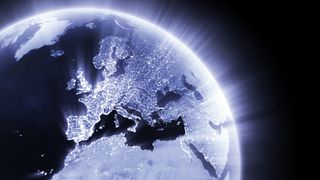30 years of the internet - but the best is yet to come
We've been strapped to a rocket for three decades. Wheeeee!

Thirty years ago this week, Vint Cerf began "a great adventure". On January 1, 1983, he and his colleagues switched on the internet.
It wasn't the internet as we'd recognise it today, of course: developments such as the Domain Name System, the World Wide Web, spam and LOLcats were still in the future.
But when Cerf's team moved DARPA's systems to the TCP/IP protocol, they created the plumbing that underpins everything we use today. They didn't just change the way a few computers communicated. They strapped the entire planet to a giant rocket and hit the ignition button.
The internet is the most disruptive technology of our times, transforming the way we live, work and play, and like any major technological shift it's both a wonderful and a terrible thing. In the right hands the internet can bring people together, create new industries and unseat dictators; in the wrong ones it can reinforce prejudice and spread hate, create monopolies and facilitate surveillance and censorship.
None of these things are the internet's fault, of course: it's like magic, or fire, as good or as bad as the people using it.
You ain't seen nothing yet
What's particularly fascinating about the net is that the innovation doesn't appear to be slowing down. The constantly connected tablets we take for granted didn't even exist three years ago, and the mobile web was pretty horrid as recently as 2007 (and it still is in some places - some rural areas struggle to get 3G, let alone LTE).
Most of the services we take for granted are relatively new arrivals, and even they're becoming old hat as new generations get online - in some cases, from incredibly young ages. Hardware is getting smaller, and smarter, and longer lasting, and better connected, and I can't wait to see what we do with it.
Get daily insight, inspiration and deals in your inbox
Get the hottest deals available in your inbox plus news, reviews, opinion, analysis and more from the TechRadar team.
If there's a cloud on the horizon it's that in some respects, we seem to be going backwards: in the dark old days of dial-up, when dinosaurs such as CompuServe and AOL roamed the Earth, tech giants tried to make the internet a series of walled gardens, their commercial imperatives corrupting the utopian ideals of the early adopters to deliver an internet based on cash, not clicks.
The open internet won that battle, but while today's names are different the results are spookily similar: for example, viewing content and clicking links inside the Facebook app for iOS isn't dramatically different from using AOL in the 1990s, and it's quite possible to use the internet all day without leaving the embrace of proprietary apps.
It'd be a shame if we were to sacrifice the exuberant, unruly, exciting and occasionally frightening internet to live inside safe, simple and soulless electronic malls, but I'm optimistic. If there's one thing we've learnt from 30 years of the internet, it's that you never know what's next.
Writer, broadcaster, musician and kitchen gadget obsessive Carrie Marshall (Twitter) has been writing about tech since 1998, contributing sage advice and odd opinions to all kinds of magazines and websites as well as writing more than a dozen books. Her memoir, Carrie Kills A Man, is on sale now. She is the singer in Glaswegian rock band HAVR.

